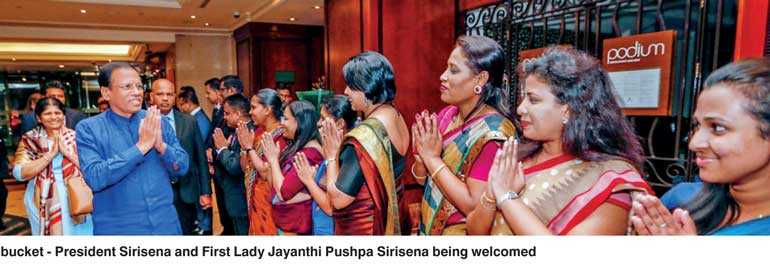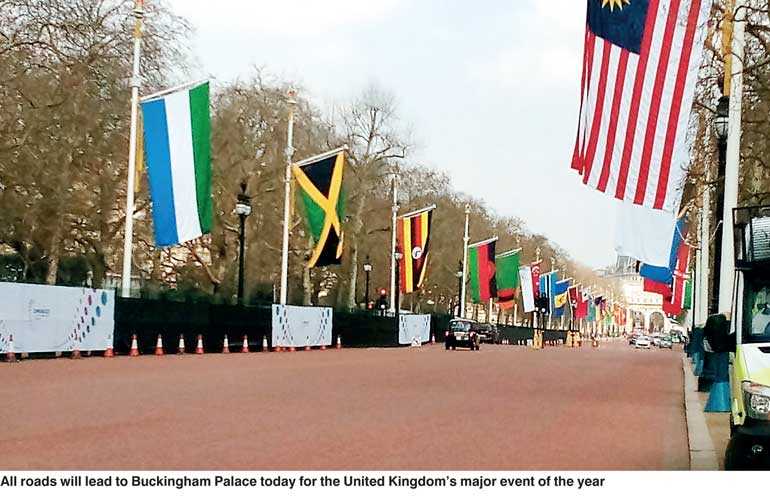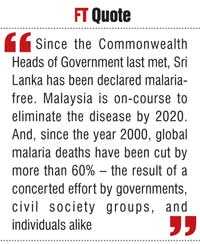Monday Feb 23, 2026
Monday Feb 23, 2026
Thursday, 19 April 2018 00:00 - - {{hitsCtrl.values.hits}}

All roads will lead to Buckingham Palace today with Queen Elizabeth II set to welcome the 53 Heads of State at the formal opening of the 25th Commonwealth Head of Meeting 2018, scheduled to be held in London and Windsor.
President Maithripala Sirisena accompanied by First Lady Jayanthi Pushpa Sirisena will make their way to the Palace and will be amongst other leaders who have arrived for this occasion, considered to be United Kingdom’s major event of the year.
The CHOGM Executive sessions are scheduled to take place today at Lancaster House at which the Chair-in-Office Prime Minister of Malta Dr. Muscat will hand over duties officially to British Prime Minister Theresa May, the incoming Chair-in-Office, and Britain will hold office until year 2020.
The grand program of the day ends with the State Dinner at Buckingham Palace. There is much speculation that the Queen will step down as Head of the Commonwealth after this event and that Prince Charles is being supported to take over. There is speculation that this would indeed be a subject for discussion and is rumoured to come to some decision on Friday at the end of sessions to take place at Windsor.
There is no natural line of succession for Prince Charles to take over after the Queen Elizabeth II. It is a position that would be determined by the members of the Commonwealth. There have been calls for this to be decided at the time that it would only be required to do so, after the Queen relinquishes her duties as the Head of Commonwealth and not now.
Meanwhile British Prime Minister Theresa May on the eve of the CHOGM said: “It is an honour for the UK to serve as host of the 25th Commonwealth Heads of Government Meeting, and it is a pleasure to welcome the world to our wonderful capital city.”
“London, perhaps more than any other place, embodies what the Commonwealth is all about. It is a city that draws strength from its diversity that welcomes people from every continent and unites them as part of a greater whole. And it is a city that is rightly proud of the contribution made to its history by members of this very special and enduring family of nations – a contribution that contributes to this day, and which we will always value,” she said.
“As we meet in this most Commonwealth of cities, the Commonwealth itself must confront global uncertainty. It is a time when our members and the wider world are faced both with emerging new threats, and with a resurgence of challenges and arguments many thought had been consigned to history,” she said.
Global challenges
The British Prime Minister spoke out on the negatives that the leaders have to deal with: “Free and fair trade, which for decades has helped to lift hundreds of millions out of poverty, is under threat from a new wave of protectionism. Climate change imperils not only lives and property, but also risks undoing half a century of progress by pushing millions back below the poverty line. And health risks continue to evolve, be it through antimicrobial resistance or the rise in non-communicable conditions such as diabetes and heart disease.”
“These are global challenges that require global solutions. Yet, at the very moment that international co-operation is so important. Some nations are choosing instead to shun the rules-based international system that underpins global security and prosperity,” she complained.
“The danger of the rules based system being undermined is nowhere more obvious right now than in Syria. On top of the huge suffering inflicted on the Syrian people by years of conflict, we have seen a persistent pattern of behaviour in the Syrian regime’s use of chemical weapons, most recently in the barbaric attack on Douma earlier this month. That the use of chemical weapons is morally wrong and strictly prohibited is one of the international community’s most protected norms. Yet in Syria, we risk seeing that principle eroded,” she added.
“We cannot allow the use of chemical weapons to become normalised – either within Syria, or on the streets of the UK or elsewhere. So through international co-operation, we must reinforce the rules-based system and ensure it is protected for future generations.”
Commonwealth ready to face the challenges
She showed confidence of the Commonwealth facing the challenges posed: “It has never been more critical that the Commonwealth demonstrate its capacity and willingness to make a difference and provide support both for the rules-based order, and the very concept of international cooperation.”
“But I am confident that our family of nations can rise to these challenges, because the Commonwealth is unique,” she said. “No other organisation can rival both our geographical and cultural diversity while giving all nations an equal role, an equal voice and equal standing. From small tropical islands to the vast Arctic tundra, from nations of just a few thousand people to countries that are home to hundreds of millions, the modern Commonwealth is a snapshot of the world at large.”
Giving examples for her confidence, she said: “I see it in business leaders who are forging new links, driving exciting innovations, and creating opportunities that will benefit millions. Most of all, I see it in the members of the Commonwealth Youth Forum. Five hundred exceptional young people from around the world, united by their desire to make their communities, their nations, their Commonwealth and their world a better place for us all.”
“Those 500 young people here in London represent many more around the world. While the Commonwealth of Nations is nearly 70 years old, the people it serves are far younger. Today, some 60 per cent of Commonwealth citizens are under the age of 30. If they are to be inspired and engaged by the Commonwealth, if this organisation is to maintain its relevance and fulfil its potential, then we must meet the challenges that the Youth Forum and others have laid at our feet,” she added.

Natural disasters
Speaking on a number of issues that are going to be tackled during the Executive sessions, the British Prime Minister said a landmark Blue Charter to safeguard our seas for generations to come would be taken up.
“The Charter sets out the principles by which member countries will lead international efforts by sustainably developing and protecting their oceans. It is a commitment to real action that will benefit members and non-members alike.”
In addition, the UK will be working with Vanuatu to lead the Commonwealth Clean Oceans Alliance, investing more than £61 million to help fellow members tackle the scourge of plastic pollution and support the sustainable growth of marine economies.
“We are only meeting in London this week because of the devastation wrought on Vanuatu by Cyclone Pam in 2015. The impact of other recent extreme weather events in the Caribbean and Pacific have underlined the vulnerability of smaller states across the Commonwealth. So I am proud to say that the UK, long a supporter of such nations, is investing a further £44 million to help improve members’ ability to prepare for and deal with natural disasters of all kinds.”
Scourge of malaria
Today, some 90% of Commonwealth citizens live in countries where malaria is endemic. Worldwide, the disease kills 445,000 people every year, many in the Commonwealth and most of them children. Malaria has a serious impact on the economies of countries it affects. The human cost is incalculable.
“We cannot talk to the young people of the world, talk about securing a legacy for our children and grandchildren, without tackling a disease that, worldwide, kills one of them every two minutes. That is why, this week, I will be calling on my fellow leaders to commit to halving malaria across the Commonwealth by 2023.
“It is an ambitious goal, but one that is firmly within our reach. Since the Commonwealth Heads of Government last met, Sri Lanka has been declared malaria-free. Malaysia is on-course to eliminate the disease by 2020. And, since the year 2000, global malaria deaths have been cut by more than 60 per cent – the result of a concerted effort by governments, civil society groups, and individuals alike.”
The UK remains committed to its five-year pledge, made in 2016, to spend half a billion pounds a year tackling malaria. Over the next two years £100 million of that will be match-funded by partners in the private sector.

 Security
Security
This year, for the first time, security is a central theme at a Commonwealth Heads of Government Meeting. “The security threats of the 21st century do not respect national borders, and our response should be no less international,” she said.
Cyber Declaration
“This week I look forward to all our members agreeing a new Cyber Declaration. A powerful statement of intent, it will ensure that the internet remains free and open across the Commonwealth. It will help protect our people and our businesses from ever-more sophisticated digital threats. And it will do much to counter those who would abuse the freedom of the internet to undermine our values, our security, even our democracies.”
Slavery
“We will also be taking action to tackle modern slavery. And I will be encouraging all Commonwealth members to endorse the Call for Action to end forced labour, modern slavery and human trafficking that I presented to the UN General Assembly last year.”
Commonwealth can change the world
“The world has changed. When, in 1953, the newly-crowned Queen Elizabeth set off on a tour of the Commonwealth, she travelled by air, sea and land on a journey that took more than five months. Today, many members of the Youth Forum have only ever known a time in which they can instantly converse with one another regardless of where in the world they live. If the Commonwealth is to endure in such a world, we must demonstrate our relevance and purpose anew. We must show what the Commonwealth is capable of.”
In the midst of international pressure and Brexit, the British Prime Minister sees this summit to be “a moment where that change begins to happen”.
“Together, we represent a third of the world’s population, a quarter of its nations. When we speak with one voice, the world has no choice but to listen. If we step up, if we choose to act, if we embrace our future… then the Commonwealth can lead the world. The Commonwealth can inspire the world, and the Commonwealth can change the world,” she concluded.